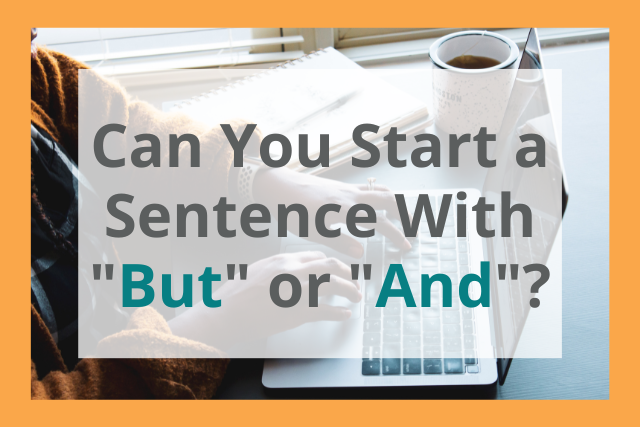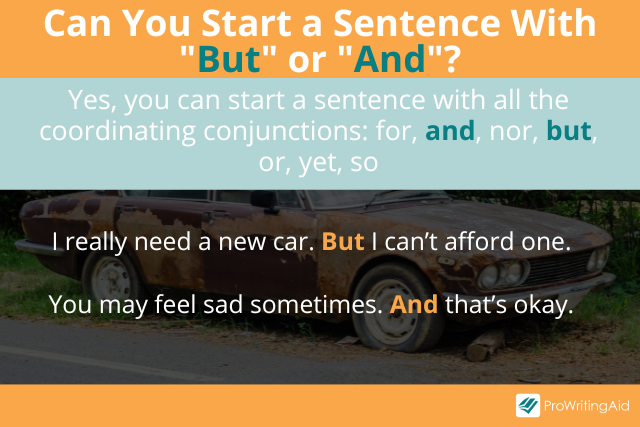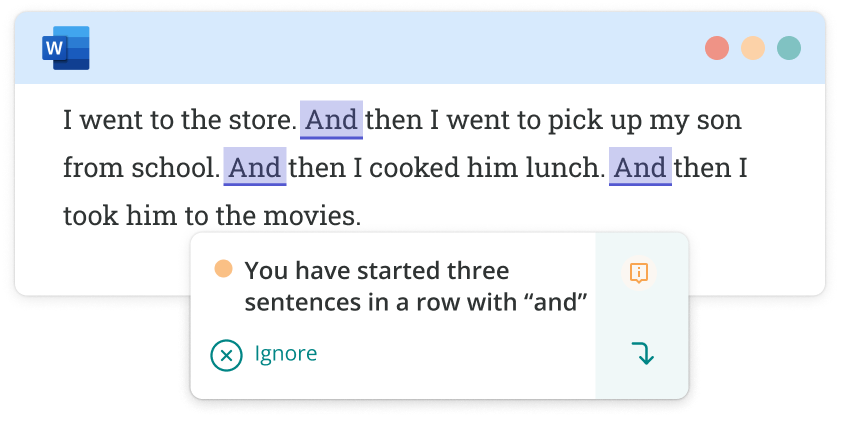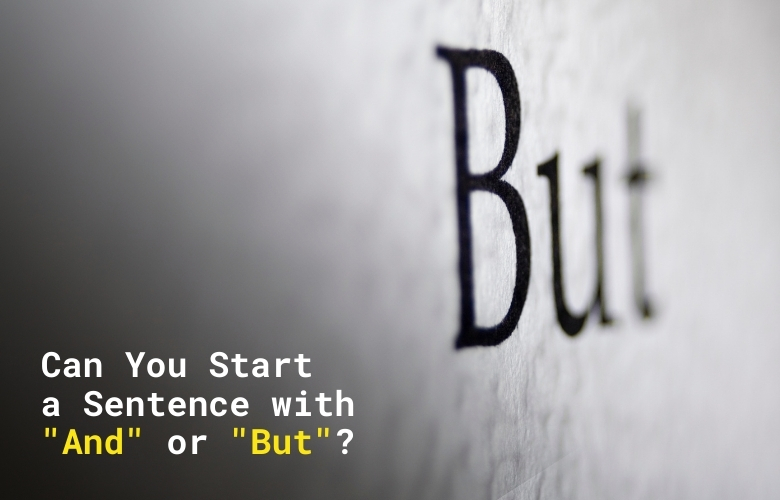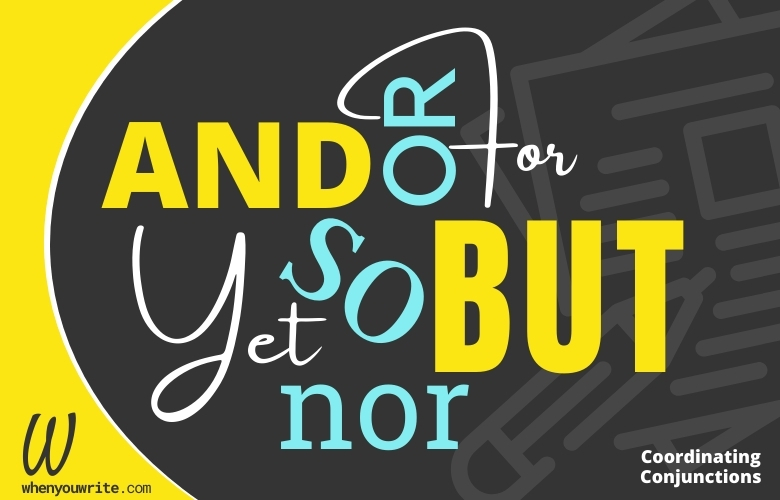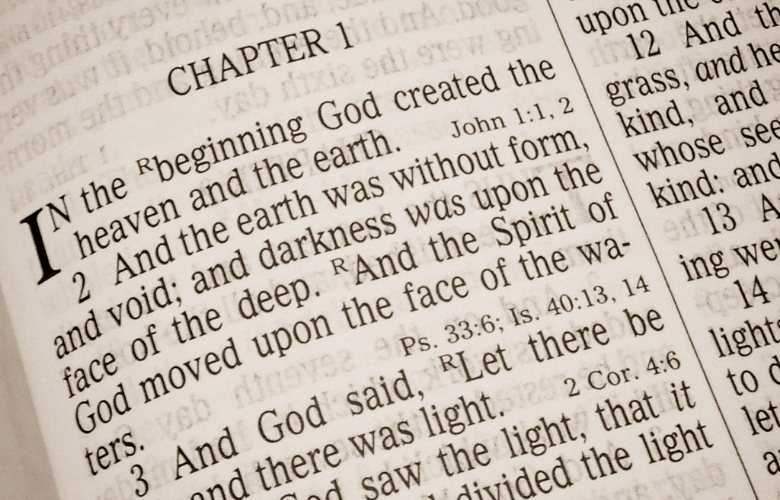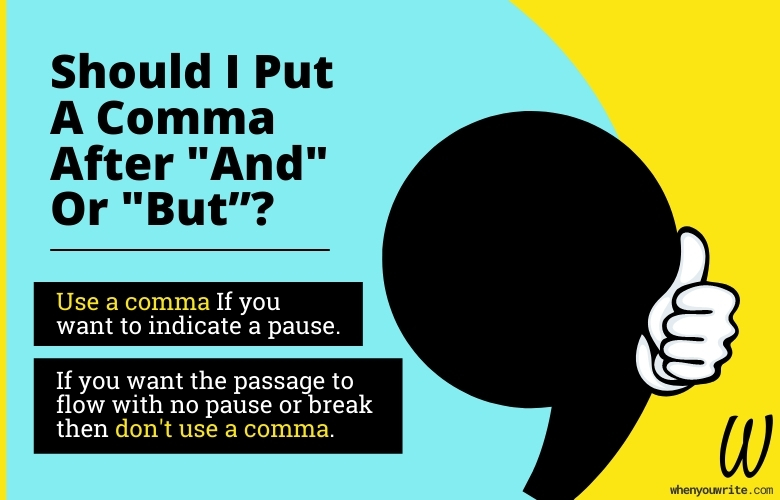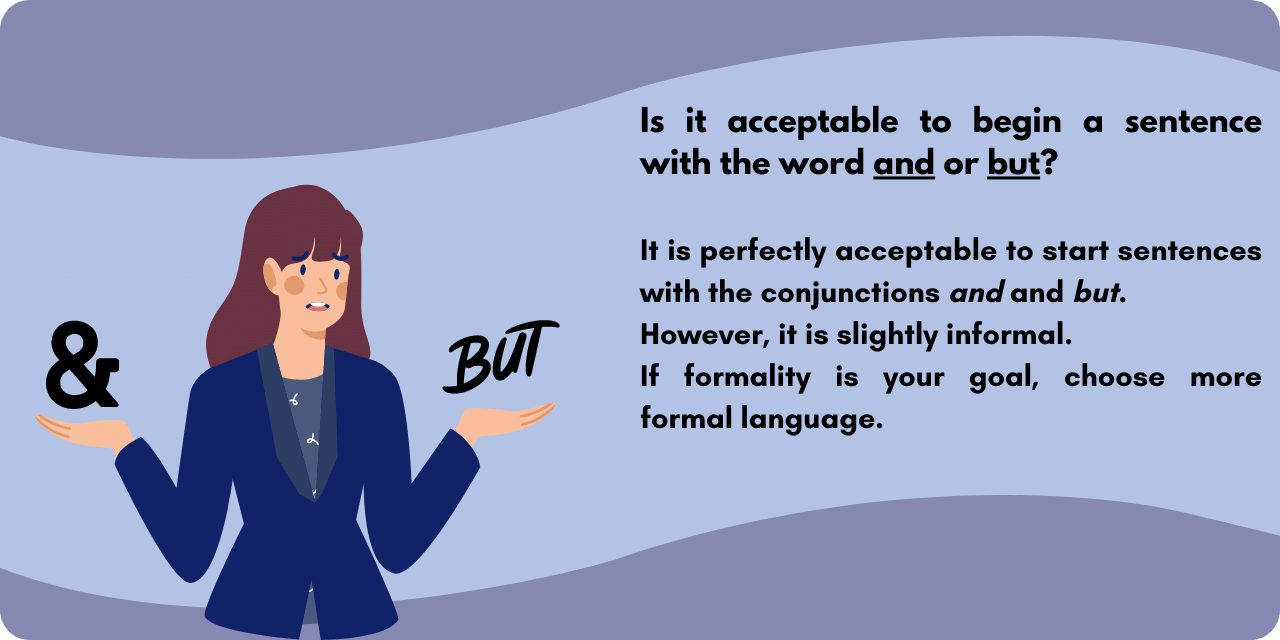If your high school English teacher drilled into your head that you should never start a sentence with and or but, you’re not alone. Most of us learned this rule in school, and we followed it in every writing assessment, research paper, and book report we ever wrote.
So, if it’s improper to start a sentence with the words “and” or “but,” then why do so many prolific authors, bloggers, journalists, and copywriters do it? It might seem like a rebellious move, but it’s not really “against the rules” at all.
It’s perfectly acceptable to start sentences with and or but as well as any other coordinating conjunctions. No grammar checker will mark it as incorrect.
Today, we’re taking a closer look at when and how to begin sentences with coordinating conjunctions like and or but.
Can You Start a Sentence with And?
A conjunction connects two thoughts or ideas. And is a coordinating conjunction, which connects two independent clauses. Independent clauses are complete sentences.
There are seven coordinating conjunctions:
- and
- but
- or
- nor
- for
- so
- yet
However, the ones we were specifically taught to avoid starting a sentence with are “and” and “but.” The good news is you can rest easy knowing there is no true grammar rule saying you can’t ever start a sentence with one of these conjunctions.
And can connect two sentences, but there’s no rule that says it has to connect them within the same sentence using a comma. Instead, and can start its own complete sentence.
Examples of Starting Sentences with And
Let’s check out some examples of and at the beginning of a sentence.
- We are going on a cruise in November. And we are going to Cancun in the summer.
- Please review the data before our meeting next week so we can discuss it. And come up with some new ideas for the next quarter.
- Will you pick up milk on the way home? And grab some ice cream while you’re there.
Can You Start a Sentence with But?
But is another coordinating conjunction. Like and, it’s perfectly acceptable to begin a sentence with but. But can also act like a subordinating conjunction.
Subordinating conjunctions introduce dependent clauses, which are clauses that cannot stand alone as complete sentences.
Both usages are grammatically correct in the English language. In fact, it’s often the best way to avoid verbose or run-on sentences.
Examples of Starting Sentences with But
Here are some examples of sentences that begin with but:
- I’d love for you to attend our party next week! But if you aren’t feeling well, I understand.
- Please review the group report by the end of the week. But don’t make any changes without running them by Anna.
- Add all the dry ingredients to the wet ingredients, and mix well. But be careful not to overmix, or your dough will be too stiff.
General Rules on Starting a Sentence with Conjunctions
Realizing now—ten, twenty, or even thirty years later—that you were lied to might be frustrating, but your teachers really did have your best interests in mind.
While there is no definitive answer as to why we were taught this “rule,” the explanation that makes the most sense is that it was meant to prevent children from writing the way they talk.
Think about it—have you listened to a child or teenager talk for any extended amount of time? If you have, then you can understand exactly what these teachers were trying to avoid.
If you haven’t, these two examples will provide some insight:
- We wanted to go to get burgers, and they weren’t open. But we still got burgers. But we had to go somewhere else to get them. But they weren’t as good as the ones we were going to get.
- My friend and I went to the beach yesterday. And while we were on the beach, we saw lots of seagulls and other birds. And this one seagull stole some guy’s fries while he was trying to eat them! And it scared the guy so much, he jumped nearly ten feet in the air!
It’s one thing to verbally hear a story told in this fashion. But reading it is an entirely different experience. No matter what the word is, you never want to start too many consecutive sentences with the same word.
The overuse of and and but in spoken English is likely the main reason our teachers forbid us from starting a sentence with them in our writing!
It’s best to avoid starting too many sentences with and or but, especially if they are close together. ProWritingAid can help you find repeated sentence starts and echoes, which are repeated words in close proximity.
When Should You Never Start a Sentence with a Conjunction?
There’s no hard rule about when you should never start sentences with conjunctions. But there are some basic guidelines to follow.
In any sort of formal writing, do not use and or but to begin a sentence because they create sentence fragments. You should avoid sentence fragments in formal writing and use them sparingly in informal writing.
You should also avoid using and or but to begin a sentence in technical writing. This doesn’t mean you can’t use these words at the start of a sentence, but you should use them less frequently than in other types of writing.
Examples of Starting Sentences with Conjunctions
Other conjunctions are also acceptable to begin sentences. Here are some examples of other coordinating conjunctions that start a sentence:
- I will not wear an ugly bridesmaid dress at your wedding. Nor will I wear high heels.
- Do you think we should accept the client’s last bid? Or should we make a counteroffer?
- The principal forgot to tell the special education teachers about the new lesson plan policy. So no one in the department turned in lesson plans this week.
Conclusion: Can You Start a Sentence with And or But?
In short, it’s absolutely fine to begin sentences with and or but. There’s no official grammar rule against it. But like any writing convention, be careful not to overuse and and but as sentence starts, and don’t use them with sentence fragments in formal writing.
Take your writing to the next level:
20 Editing Tips from Professional Writers
Whether you are writing a novel, essay, article, or email, good writing is an essential part of communicating your ideas.
This guide contains the 20 most important writing tips and techniques from a wide range of professional writers.

Remember your high school English always reminding you that you can’t start a sentence with “and” or “but”?
Well, I’m here to tell you that you can start a sentence with a coordinating conjunction, whether “and,” “but,” or the others.
It’s totally okay.
I believe, though, that starting a sentence with these words still looks and feels awkward and tingly for some people. So, it’s better to employ coordinating conjunction as sentence starters reservedly.
I have rushed into the discussion, haven’t I? Let’s from the beginning.
Is It Ever Ok to Start with “And” Or “But”?
Schools were strict with their stance on the correctness of using these particular coordinating conjunctions (“and” or “but”) as sentence starters. But this is an outdated rule, and it’s now acceptable—in most circles—for you to use “and” or “but,” just like I did with this sentence.
And that’s just me being nice, this rule never existed! In fact, I’ll just go ahead and do a whole section on the invalidity of this rule.
Did you notice that I started the last two sentences with “but” and “and”? did anything seem nonconformist with the way I started those sentences? My thoughts exactly!
Actually, “and” and “but” are just two members of a medium-sized coordinating conjunctions family (as I might have hinted in the introduction). There are 7 in total, and the rest are:
- Or
- Nor
- for
- so
- yet
Although I’m just focusing on “and” and “but,” I just wanted to iterate that the rest of the coordinating conjunctions can be used to start a sentence.
Is It Grammatically Correct to Start a Sentence with Either “And” Or “But”?
I’m sure your teachers would always say, “no! no! no! This is grammatically incorrect! Use a conjunctive adverb instead.”
I’d agree with them, 50% of the time, probably. In some contexts, they were right.
But when is it grammatically okay to start a sentence with “and” or “but”?
Just like many other things in life, there is always a perfect time and place for starting a sentence with either “and” or “but.”
So where’s this perfect time and place to put “and” or “but” at the beginning of your sentence?
There’s one important thing you need to remember; if you start a sentence with either one of these coordinating conjunctions, you’re using these words as transitions. You are using them to link two ideas; therefore, your phrase needs one that stands on its own.
If your sentence can’t make sense on its own (without the “and” or “but”), you need to reconstruct it. You could merge the sentence with the preceding one and use “and” or “but” to indicate a transition within the sentence separated by a comma.
An excellent grammar teacher would tell you that it’s perfectly okay to use a coordinating conjunction to launch a sentence which is an independent clause.
I usually employ “and” or “but” as sentence starters in informal types of writing because I still believe that those non-indulgent grammar Nazis are a bit more relaxed reading informal texts than when they read formal ones.
What Can I Use Instead of “And” & “But” To Start a Sentence?
Your writing might be exposed to audiences that are a bit more sensitive to casualness that “and” or “but” represent. In this case, you might want to use substitutes that sound just a little bit more formal.
It is always good to consider your audience and the tone you want the text to have.
Under such circumstances, conjunctive adverbs like “however,” “nevertheless,” “moreover,” “thus,” “furthermore,” or “additionally” might just do the trick. They add that mite, enough to improve the professionalism nip of your writing.
It’s worth noting though, that in some contexts, using words like “moreover” or “furthermore” does sound too formal and stodgy. But in less casual contexts, like business writing, these alternatives are just perfect.
But it’s still up to you. Totally.
The thing is, “and” or “but” are more impactful and might relay your transition better than the other coordinating conjunctions and conjunctive adverbs. So, the choice is yours—do you want a more impactful transition or formality.
Bottom Line? There Is No True Grammar Rule That Says You Can’t
“It’s the teachers’ fault!”
Ha-ha.
On a serious note though, I don’t think the teachers were completely wrong. It’s just as a result of the mistrust they had for us students back then. They knew we could use “and” or “but,” but didn’t deem us creative enough to effectively use these words as sentence starters in our writing.
I think they—genuinely—were afraid to let us use “and” or “but” to start our sentences because they thought our writing would sound just like a 5-year old trying to explain a Spider-Man movie. I honestly think that was the initial worry.
So they went around slapping this non-existent rule on every innocent and ignorant student they could find. And boy did it scare us from using “and” or “but” at the start of our sentence.
Examples from Popular Book: Sentences Starting with “And” or “But”
What if I told you that Shakespeare, J.K Rowling, and Abraham Lincoln (Yes, POTUS 16) all used “and” or “but” as sentence starters?
I bet you wouldn’t believe me right away.
So, I picked some of these sentences to prove my case. There are just six examples here, but there are millions of examples used by famous authors.
“And”
The US Constitution Article. IV, Section 1
The Constitution of the United States also used “and” as a transition word that adds more information to the previous statement.
‘Full Faith and Credit shall be given in each State to the public Acts, Records, and judicial Proceedings of every other State. And the Congress may by general Laws prescribe the Manner in which such Acts, Records and Proceedings shall be proved, and the Effect thereof.’
Genesis, Chapter 1, The Bible, King James version
The book of Genesis is littered with “and.” I believe it’s because of the impactful transition that I talked about in the previous sections.
‘In the beginning God created the heaven and the earth.
And the earth was without form, and void; and darkness [was] upon the face of the deep. And the Spirit of God moved upon the face of the waters.
And God said, Let there be light: and there was light.
And God saw the light, that [it was] good: and God divided the light from the darkness.
And God called the light Day, and the darkness he called Night.
And the evening and the morning were the first day.’
President John F Kennedy (POTUS 35)
‘And let every other power know that this hemisphere intends to remain the master of its own house.’
“But”
Harry Potter and the Sorcerer’s Stone by J. K. Rowling.
On page 3, Rowling employed “but” as a transition word
‘But on the edge of town, drills were driven out of his mind by something else.’
Hamlet by William Shakespeare.
Shakespeare also denounces this non-existent grammar rule in his play—The Tragedy of Hamlet, The Prince of Denmark.
‘Horatio: So have I heard and do in part believe it.
But look, the morn, in russet mantle clad,
Walks o’er the dew of yon high eastward hill.’
Oscar Wilde (Playwright)
‘It is better to be beautiful than to be good. But, it is better to be good than to be ugly.’
Should I Put a Comma after “And” or “But”?
If you use these coordinating conjunctions to start a sentence, it means you’re using them like or instead of conjunctive adverbs such as “however,” “consequently,” or “therefore.”
A good question might arise: Don’t we need to put a comma after “and” or “but”? you know, just like we do with conjunctive adverbs?
Uh… it depends. Do you want to indicate a pause? Then there’s no other way than to use a comma. If you want the passage to flow with no pause or break then don’t use a comma.
Let me give other examples to illustrate this:
I’ve had a perfectly wonderful evening. But, this wasn’t it. [Groucho Marx]
In this example, Marx puts a comma after the “But” to indicate a pause.
“But whether the interruption be slight or considerable, he must never omit one comma and leave the other.” The Elements of Style by Strunk and White.
In this one, there’s no comma after the “But” and that’s an indication that there’s no pause.
This comma is not necessary, really. When you use a coordinating conjunction, it’s not relevant whether you put it there or not. However, with conjunctive adverbs, it’s a totally different case—it is advisable to use a comma whenever you employ a conjunctive adverb.
Conclusion
So yeah, it’s perfectly fine to use “and” or “but” to launch a sentence—and you can take my word for it.
Again, let me brandish the word of caution: always consider the audience and tone before starting sentences with “and” and “but.”
Remember when you want to sound more professional, go with conjunctive adverbs, and employ coordinating conjunctions when you write something a bit more informal.
In the past, English teachers used to preach that one should never start a sentence with conjunctions like and or but. Does this rule still apply today?
Not entirely. It is already acceptable to start sentences with such conjunctions. Some authorities, in fact, even defend that for some cases conjunctions will do a better job than more formal constructions. Here is a quotation from Ernest Gowers addressing the usage of and on the beginning of sentences:
That it is a solecism to begin a sentence with and is a faintly lingering superstition. The OED gives examples ranging from the 10th to the 19th c.; the Bible is full of them.
While it is acceptable to use such conjunctions to start a sentence, you should still use them carefully and efficiently, else your text might become choppy.
Secondly, many people still regard such usage as informal. If you are writing a formal piece or if you are not sure how your audience might react to conjunctions at the beginning of a sentence, you could substitute them with more formal terms. Below you will find some examples.
But I am still awaiting his reply.
Can be written as:
However, I am still awaiting his reply.
Although I am still awaiting his reply.
Nevertheless, I am still awaiting his reply.
And she was running very fast.
Can be written as:
Moreover, she was running very fast.
In addition, she was running very fast.
Furthermore, she was running very fast.
Stop making those embarrassing mistakes! Subscribe to Daily Writing Tips today!
You will improve your English in only 5 minutes per day, guaranteed!
Subscribers get access to our archives with 800+ interactive exercises!
You’ll also get three bonus ebooks completely free!
Posted by

In our business writing classes, people often want an answer to this burning question:
Is it acceptable to begin a sentence with the word and or but?
The answer is yes. It is perfectly acceptable to start sentences with the conjunctions and and but. However, it is slightly informal. If formality is your goal, choose more formal language.
Informal:
But we hope to write an agreement today.
(no comma needed after but)
Formal:
However, we look forward to writing an agreement today.
Nevertheless, we look forward to completing the agreement today.
Informal:
And Clare knows how to write a good report.
(no comma needed after and)
Formal:
In addition, Clare is skilled in writing reports.
Furthermore, Clare is a skillful report writer.
There’s one rule you do have to follow: Meet your reader’s needs. For example, if your supervisor (or your supervisor’s supervisor) doesn’t approve of beginning a sentence with a conjunction, avoid it. After all, he or she is one of your most influential readers.
But here’s an alternative: Why not bring out an excellent reference manual and try to do some supervisor development?
And if you need help, email me!
-
EM
-
Articles
-
Usage
-
Conjunctions
Summary
It’s grammatically fine to start a sentence with and, but, or any other coordinating conjunction. Do this when you want to emphasize the connection between two sentences.
Examples
- Diagnostic tests are now chargeable. Local hospitals have lost their funding. Community programs are ending. And the mobile app used to track appointments no longer works.
- The government is under pressure to provide fuel subsidies and tax breaks to businesses. But public health is as important as the price of fuel.
- You can pay by credit/debit card, e-wallet, prepaid card, or wire transfer. Or you can simply send us cash in an envelope.
In creative writing, the pause indicated by a period before and or but can lead up to a twist or a punch line and make a sentence more forceful and urgent.
Examples
Louis writes; Susan writes; Neville writes; Jinny writes; even Bernard has now begun to write. But I cannot write. I see only figures. The others are handing in their answers, one by one. Now it is my turn. But I have no answer.
— Virginia Woolf, The Waves (1931)
The past is whatever the records and the memories agree upon. And since the Party is in full control of all records, . . . the past is whatever the Party chooses to make it.
— George Orwell, Nineteen Eighty-Four (1949)
Don’t overuse conjunctions: not every sentence needs to start with and or but. And always make sure to use the right conjunction for the job.
And or but at start of sentence
It’s grammatically fine to start a sentence with and, but, or any other coordinating conjunction like or, yet, and so. Such words emphasize the connection between one sentence and another.
Examples
- Lulu wakes up at five in the morning. She goes to school. She has a part-time job. And she volunteers at her local animal shelter.
- This used to be a busy street full of shops and restaurants buzzing from morning to night. But the businesses are all now shuttered and silent.
- Scientists have now established that cats are intelligent beings. They understand words. They can read facial expressions. And they can teleport to parallel dimensions. But they still cannot resist the urge to poke their heads into a vase.
Coordinating conjunctions like and and but connect words, phrases, clauses, or sentences of equal status.
Examples
- earth and sky
- yellow lemons or green oranges
- Maya wants to go for a walk, but the city is under lockdown.
When a coordinating conjunction connects two sentences, it appears at the start of a sentence.
Example
- What Maya needed was to go for a walk in the park. But the city was under lockdown, and all she could do was look out the window.
A conjunction like and or but can also effectively link the first sentence of a paragraph to the last one of a previous paragraph.
Example
- . . . were unable to trace the source of the radiation.But recent advances in astrophysics have revealed that . . .
Starting a sentence with a coordinating conjunction is a useful way to highlight the link between sentences. In this article, we discuss when it is appropriate to start a sentence with a conjunction like and or but, and what to keep in mind to use these conjunctions correctly.
Emphasis
Use words like and, but, and so at the start of a sentence only if you want to emphasize them.
Examples
- I could cook a healthy meal, eat it, wash the dishes, and then work out. Or I could just stay in bed.
- It was an expensive restaurant, the kind where you dine rather than eat. We dutifully dined on six courses, accepting all the server’s suggestions. And then we realized we had no money.
- Farley drove at 70 mph all the way to the station, ignoring furious drivers, angry pedestrians, and startled pigeons. But he still missed his train.
- One morning Maya woke up to the realization that there were other ways to live. So she did the sensible thing and packed her bags for Fiji.
The period before the conjunction denotes a pause, which makes the next sentence more forceful. In creative writing, this can help create drama within a narrative. Compare this with sentences where the conjunction appears in the middle rather than at the start. Using a comma instead of a period warns the reader that there’s more to come, gently introducing the next thought, taking away the element of surprise.
Examples
- I could cook a healthy meal, eat it, wash the dishes, and then work out, or I could just stay in bed.
- We dutifully dined on six courses, accepting all the server’s suggestions, and then realized we had no money.
- Farley drove at 70 mph all the way to the station, ignoring furious drivers, angry pedestrians, and startled pigeons, but he still missed his train.
- One morning Maya woke up to the realization that there were other ways to live, so she did the sensible thing and packed her bags for Fiji.
Not all sentences need to start with a conjunction. A coordinating conjunction (like and, but, so, and nor) is usually perfectly fine appearing within a sentence.
Example
- Poor: It wasn’t raining. But Poco carried an umbrella along to the park.
The information that someone carried an umbrella to a park is not impactful enough to deserve a sentence-initial but.
Better: It wasn’t raining, but Poco carried an umbrella along to the park.
But if what you’re saying does deserve a sentence-final pause before it is said, use a period and then the conjunction.
Example
- When you’re sad, you are asked to remind yourself of all the millions of people less fortunate than you. But why would that make you feel better?
Such usage can lend a dramatic tone to text. This is why and and but are not often used to start sentences in academic and other formal writing.
Formality
In academic and business writing, which requires a more objective and less dramatic tone, writers are advised to avoid starting sentences with coordinating conjunctions like and and so. In a thesis or a statement of purpose, for example, most editors will replace a coordinating conjunction at the start of a sentence with transition words like however, furthermore, therefore, and nevertheless, also called conjunctive adverbs. (A conjunctive adverb connects two clauses or sentences, much like a conjunction.)
Examples
- Less formal: Our study did not yield conclusive results. But we believe our paper should be published since it includes data collected from a wide range of sources.
More formal: Our study did not yield conclusive results. Nevertheless, we believe our paper should be published since it includes data collected from a wide range of sources.
Less formal: Our sensors failed on the third day of the experiment. And all our data was lost in a hard disk crash.
More formal: Our sensors failed on the third day of the experiment. Furthermore, all our data was lost in a hard disk crash.
Less formal: After eight years of research, our study did not yield conclusive results. So we decided to abandon science altogether and become rock musicians.
More formal: After eight years of research, our study did not yield conclusive results. Therefore, we decided to abandon science altogether and become rock musicians.
Choice of conjunction
It’s fine to start a sentence with a conjunction like and or but, but make sure you use the right one for the job. Every conjunction expresses a specific logical relation. Check that the conjunction you use at the start of a sentence links back meaningfully to the previous sentence.
Examples
- Incorrect: We did everything we could to save the tree. And it was too late: the roots were already dead.
Correct: We did everything we could to save the tree. But it was too late: the roots were already dead. - Incorrect: Anita gave up on the algorithm altogether. She tried not to even think about it. But then one morning, the answer just came to her.
Correct: Anita gave up on the algorithm altogether. She tried not to even think about it. And then one morning, the answer just came to her. - Incorrect: We all know that people lie. So when we read something in a news article or a blog, we think that since it has been written down, it must be true.
Correct: We all know that people lie. Yet when we read something in a news article or a blog, we think that since it has been written down, it must be true.
As you can see, words like and, but, and so are susceptible to misuse. When you start a sentence with a conjunction, check that your choice of word is correct.
Tip
Don’t use but if no contrast is implied.
Example
- Incorrect: Farley set up the experiment and went to bed. But by morning, all the cells were dead.
Some information is missing here. Don’t use but unless the contrast is clear.
Correct: Farley set up the experiment exactly as he was supposed to. But by morning, all the cells were dead.
Overuse and misuse
Don’t use a conjunction like and or but between two sentences unless you need to emphasize the link between them. Sentences logically presented one after another are automatically connected in the reader’s mind. Starting a sentence with a conjunction makes this connection more urgent and forceful.
Example
- Incorrect: Maya has always wanted to travel. And she has dreamed of nothing else since she was young. But something kept getting in the way. So sometimes it was a job; other times, family. And she just never found the time to do the things she wanted. So she thought her life had slipped away from her. But then one morning, she woke up and realized it’s never too late. So she has booked herself a one-way ticket for a holiday in Fiji. And she has no specific plans, no itinerary, and no idea where she’ll go from there. But she can’t wait to find out.
- Correct: Maya has always wanted to travel. She has dreamed of nothing else since she was young, but something kept getting in the way. Sometimes it was a job; other times, family. She just never found the time to do the things she wanted. She thought her life had slipped away from her. Then one morning, she woke up and realized it’s never too late. She has booked herself a one-way ticket for a holiday in Fiji. She has no specific plans, no itinerary, and no idea where she’ll go from there. But she can’t wait to find out.
Teachers discourage students from using coordinating conjunctions at the start of a sentence because such words are easily overused or misused. But you don’t have to avoid starting sentences with and or but; just make sure to use a conjunction only when it’s needed.
Examples
- I would watch this movie a hundred times over. And then I’d watch it once more.
- The campaign’s PR machinery swung into gear: discrediting journalists, uploading propaganda, writing articles, trolling posts on social media. But the cat was out of the bag, and no amount of pretending there was no cat would put it back in.
Tip
Don’t place a comma after a conjunction (unless before a parenthetical element).
Example
- Incorrect: I wanted to tell him how much he meant to me. But, the time for words had passed.
Correct: I wanted to tell him how much he meant to me. But the time for words had passed.
Examples from literature
Writers start sentences with conjunctions like and and but when they want to clearly show the link with the previous sentence or add an element of drama, surprise, or urgency to their prose.
Examples
All through it, I have known myself to be quite undeserving. And yet I have had the weakness, and have still the weakness, to wish you to know with what a sudden mastery you kindled me, heap of ashes that I am, into fire.
The flower bloomed and faded. The sun rose and sank. The lover loved and went. And what the poets said in rhyme, the young translated into practice.
He had a word, too. Love, he called it. But I had been used to words for a long time.
Literature and history, these two great branches of human learning, records of human behaviour, human thought, are less and less valued by the young, and by educators, too. Yet from them one may learn how to be a citizen and a human being.
— Doris Lessing, Prisons We Choose to Live Inside (1986)
Don’t misunderstand me. I am not scoffing at goodness, which is far more difficult to explain than evil, and far more complicated. But sometimes it’s hard to put up with.
Some kinds of order were too vast for a human to know. But below the chaos of a single human life, you could trust that a cosmic breve was sounding.
In academic and other formal usage as well, starting sentences with and and but is an acceptable way to link ideas. Here are a couple of examples from an editorial in Nature.
Examples
- REACT-1, a long-running random-testing study, will lose its government funding at the end of this month. And ZOE, a mobile app that residents can use to log their COVID-19 symptoms, has lost its public funding, too.
- Of course, national budgets are being stretched thin. . . . But scaling back virus surveillance at this time is short-sighted.
— “This is no time to stop tracking COVID-19,” Nature (March 23, 2022)
Other conjunctions at start of sentence
Other conjunctions like because and since can also be used to start a sentence. While and, but, and or are coordinating conjunctions, because, since, although, whereas, etc. are subordinating conjunctions, which make one clause dependent on another for meaning. A sentence might start with because, for example, so that the main clause can gain end focus in the sentence.
Examples
- Because you asked me to, I added more sugar.
- Although cucumbers are used as vegetables, they are botanically fruit.
- Since you are already here, why don’t you talk to her yourself?

